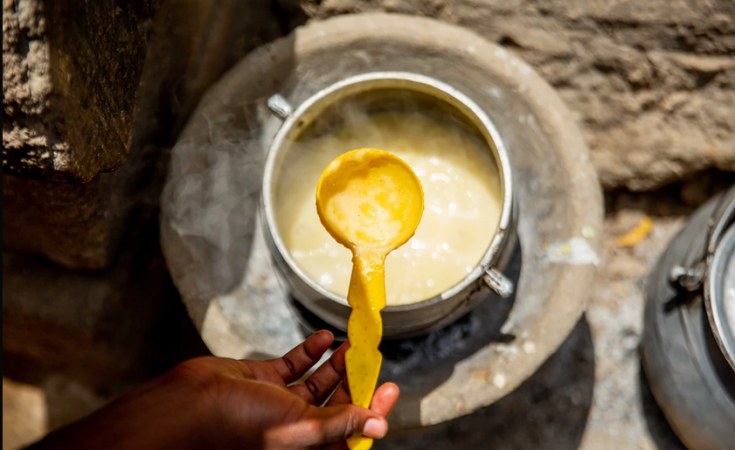WFP and partners call for collective action to prevent catastrophic food insecurity in Africa's most populous country
Hunger came calling after Fatima Ahmed's husband lost his job in northern Nigeria. Her family of five began skipping meals to make ends meet.
But it could have been worse. Without food and nutrition assistance from the World Food Programme (WFP), they would be eating just once daily.
"We used to get abundant food every morning, afternoon and night," Ahmed, who is 22 and has three children, recalls of better times when her husband worked as a cleaner for a medical centre. "We didn't go hungry like we do presently."
Ahmed and her family, who live in Katsina State, count among millions of Nigerians caught up in one of the world's biggest hunger crises - which is expected to sharply escalate next year. New expert findings, known as the Cadre Harmonisé, predict more than 33 million people will face food insecurity during the June-August 2025 lean season between harvests - roughly 8 million more than today.
Millions of children, along with pregnant and breastfeeding mothers and girls, are also at risk of acute malnutrition or worse, the findings showed. Fuelling the alarming food security crisis for Africa's most populous state - and largest economy - is a toxic mix of conflict, soaring inflation and the fallout of climate change. Millions of people have been displaced and livelihoods have been smashed.
"Never before have there been so many people in Nigeria without food," said Chi Lael, head of communications for WFP Nigeria, before echoing similar calls from our United Nations partners, the UN Children's Fund and the Food and Agriculture Organization (FAO): "Our collective response must be immediate and massive in scale."
Averting catastrophe
This year, WFP plans to assist 1.6 million people with food and nutritional support. But with millions more projected to fall into hunger next year, needs are surging and funding is not keeping pace. For the next six months alone, we need nearly US$118 million to assist the most vulnerable.
"We have it within our grasp to stem this crisis and avert catastrophe in Nigeria if we respond now," says Lael, indicating the joint humanitarian action required to support the Government's response in preventing and mitigating food insecurity, and providing life-saving relief. "It will be challenging but it can be done."
Torrential rains and floods across much of Nigeria this year uprooted hundreds of thousands of people. They also destroyed more than 1 million tons of crops, FAO estimates - enough to feed 13 million people for a year. Armed violence, herder-farmer conflicts, kidnappings and other forms of insecurity have also increased population displacements and needs.
Three conflict-hit northeastern states - Borno, Yobe and Adamawa - are forecast to be hardest hit by hunger next year. But others, including restive Katsina State in northwestern Nigeria - where Ahmed and her family live - are emerging as new hunger hotspots, the latest expert findings show.
After her husband's earnings dried up, Ahmed cut breakfast from the family's menu. Sometimes she and her husband skip another meal as well.
"Due to the lack of food, I will stay hungry to feed my children," Ahmed says.
A long wait for dinner
Earlier this year, under a project funded by the Government of Nigeria and the Economic Community of West African States, Ahmed and her children began receiving US$32 a month, along with specialized nutritional foods from WFP, which offered some reprieve.
"Had we not received this assistance, we would have waited until the evening before eating." she said of the support.
Asmau Mohammad and her family, also from Katsina, received WFP support too. Mohammad and her husband have jobs - as a tailor and textile seller, respectively - but their earnings have not kept pace with soaring prices. Unrest has also fuelled hunger, she says, adding to the challenge of feeding the couple's seven children.
"The situation we're in is one of insecurity, with kidnappings and displaced people everywhere," says Mohammad. Local farms are no longer operating in the volatile environment, she adds, shrinking the amount of available produce.
"I have reduced the quantity of food that I cook," Mohammad says. Her children sometimes cry out from hunger.
WFP assistance has helped. "Before we ate twice a day. With this support, we can even eat three times a day," says Mohammad, who believes more food assistance will also keep children from stealing or engaging in other harmful activities.
She is also looking beyond today's hunger crisis.
"We are trying to give our children a good upbringing and education," Mohammad says. "God willing, when they grow up, we would like to have a doctor, a teacher and a civil servant among them."


